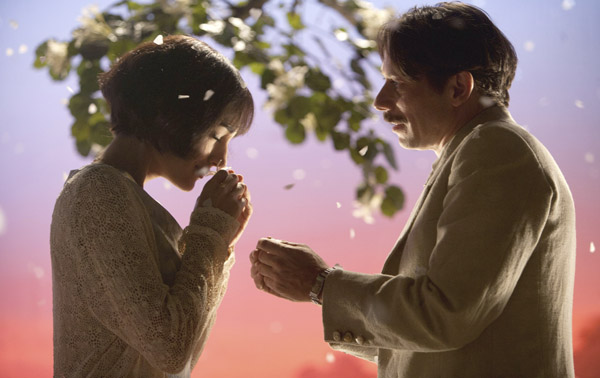
Golshifteh Farahani and Mathieu Amalric in CHICKEN WITH PLUMS (Patricia Khan/Sony Pictures Classics)
![]() Marjane Satrapi and Vincent Paronnaud’s Chicken with Plums is the visual equivalent of an intoxicant. One beautiful setting or image hazily dissolves into another, producing an enthralling kaleidoscope from which you can’t look away. The cinematography also serves as a strong defense for the use of film over ever-encroaching digital photography. That’s not to say there may not be a CGI trick or two, but most of the winning special effects have the look of the sophisticated yet man-made wizardry of a Michael Powell and Emeric Pressburger extravaganza—from 60 years ago—with its oblivious painted backdrops, studio sets, and a theatrical sleight of hand.
Marjane Satrapi and Vincent Paronnaud’s Chicken with Plums is the visual equivalent of an intoxicant. One beautiful setting or image hazily dissolves into another, producing an enthralling kaleidoscope from which you can’t look away. The cinematography also serves as a strong defense for the use of film over ever-encroaching digital photography. That’s not to say there may not be a CGI trick or two, but most of the winning special effects have the look of the sophisticated yet man-made wizardry of a Michael Powell and Emeric Pressburger extravaganza—from 60 years ago—with its oblivious painted backdrops, studio sets, and a theatrical sleight of hand.
Satrapi and co-director Paronnaud freely and fluidly spin many yarns to form a dense, intricate tapestry of a highly fantastical, cosmopolitan (and Western-oriented) Tehran of 1958. In that sense, it’s much like Satrapi’s autobiographical Persepolis, which was nominated for a Best Animated Feature Academy Award in 2008, also co-helmed by Paronnaud. (This companion piece is about another side of the family in Persepolis. However, both films hold up on their own.)
The storyline takes the form of a Russian doll, one plotline reveals another underneath, and counts down the last eight days of Nasser-Ali (Mathieu Amalric, leading an international cast). He has won worldwide acclaim as a virtuoso violinist during an self-imposed, 20-year exile from Teheran. In his forties, he returns to his hometown, and is pushed into a marriage by his formidable mother (the consistently impressive Isabella Rossellini). His bride, Faringuisse (Maria de Medeiros), has loved him from afar since she was child and has held out hope for his return. But his marriage feels more like an imprisonment. Love, at least for him, never arrives, and now that his beloved Stradivarius has been damaged beyond repair, he decides to die since no other violin would give him such pleasure. From the moment Nasser-Ali appears, he oozes with resignation; he won’t be able to find the same magic again and he knows it. But it’s not only the loss of his musical instrument that sends him to his deathbed, but a chance street encounter with a woman who fails to recognize him.
Meanwhile, his two preadolescent children are strangers to him. Loquacious but pedestrian Cyrus aspires to become a grocer, and abruptly the film jumps ahead several decades to zoom in on Cyrus’s future life in the U.S. (in Wyoming, of all places), married to a big-haired blond Midwestern American beauty. In this tangent, the film spoofs the three-camera lowbrow family sitcom, also lampooned and used as a narrative device in Oliver Stone’s Natural Born Killers. (If Stone’s frenetically paced movie is a crystal meth rush, then Chicken is more a blissed-out trip; I’d rather have what Satrapi and Paronnaud are having.) Then the film takes another droll detour, delving into the future of Nasser-Ali and Faringuisse’s obedient, studious daughter, who will grow up to become addicted to alcohol, nicotine, and gambling, and pungently played by Chiara Mastroianni with more ennui than even Marlene Dietrich could muster. The film liberally allows all of Nasser-Ali’s family to step forward and claim focus.
But the movie’s really about Iran, a lost idealized world filtered through memories and lighting gels, imbued with a sense of sadness for a former way of a life, or at least for what could have been. Twenty years earlier, before he sets out for a career, Nasser-Ali falls in love with the utterly gorgeous woman and not coincidentally named Iran (Golshifteh Farahani), the daughter of an extremely protective and prosperous single father. (Luckily, her name’s about as symbolic as the movie gets.) Though visually dazzling, like the rest of the film, the last flashback recounting their thwarted romance is the film’s weakest strand. Iran (the woman, not the country), is, unlike the other characters, a one-sided prism. Their courtship amounts to the love between the belle of the ball and a respected artist, and there’s doesn’t seem more resonance to their romance than that.
Nevertheless, the tone’s beautifully melancholic, maybe due in part to the Rachmaninoff riffs in the score. Yet at its most fatalistic, there’s a drive to the storytelling, which spins in any direction, like a conversation over coffee, or cognac more like it. Though the success of the film relies on the technical prowess of cinematographer Christophe Beaucarne and a rich production design, the writer/directors inherit fondness for their characters permeates every sequence.
Maybe the stimulant that best suits the dreamy and ethereal tone is opium. The movie’s definitely a smoker’s delight, with a scene in a backroom opium den and the sheer amount of tobacco smoked. Nasser-Ali’s mother also defiantly declares, as she deeply inhales tobacco, “Smoke is the food of the soul.” I’m sure that’s the sole reason for the otherwise family-appropriate film’s elevated PG-13 rating: Chicken with Plums makes smoking sensuous again (speaking of Dietrich). Even this non-smoker covets a drag.
















Leave A Comment